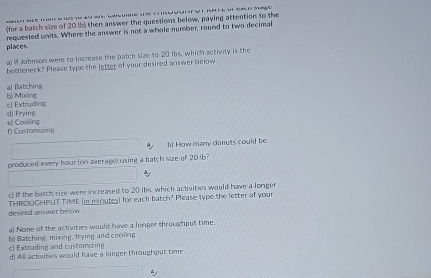Answered step by step
Verified Expert Solution
Question
1 Approved Answer
Mini Case: JAFI Donuts ( JAFI ) Dewey Johnson sat in his office contemplating the past year of operation of his JAFI Donuts ( JAFI
Mini Case: JAFI Donuts JAFI
Dewey Johnson sat in his office contemplating the past year of operation of his JAFI Donuts JAFI shop located in Winnipeg. Manitoba. JAFI served walkin customers, and also made donuts to be stocked at local grocery stores and coffee shops. Over the past year, Johnson had spent considerable time trying to increase sales but had not spent much time focused on the operations of the shop. Through his window, he could see the line for donuts extending well into the parking lot. While he was pleased with the results of his sales push, he realized he needed to assess his capacity and maybe consider expansion.
Product Sales
Donut production at JAFI was currently limited to a single hr shift per day, days per week. During peak hours, Johnson maintained a staff of to employees that was more that capable of running the highly automated process without any additional slowdown. Currently Johnson sold, on average, dozen donuts per day of all varieties. The standard batch size that he had instructed his employees to use was
The Production Process
The donutmaking process consisted of four stages: batching mixing, production, and customization.
The batching stage started with an operator combining all the ingredients in a mixing bowl. Water was added first, followed by all of the dry ingredients contained in JAFI's
Produrt Sales
The Praduction Process
The Praduction Process presuction, and Gustorricetion.
The batching stage started with an operator combining all the imypediens in a mixings. proprietary danut recipe. It toak I minutes to place the ingredients in the mixims
After the batching stape, the batch wos placed in the mixs. The mixing process trok minutes per hatch, and the mixer tument off automatically at the end of the pracess.
The production stabe cansibted af these steps: extrueting, fryine, and glozing
After the mixing stage finished, the dough was transferrod into the extrusion
The batching stage started with an cperator combinirs all the ingrelisents in a miesing bowl. Water was adided first, followed by all of the dry ingrodients contained in JAFI's proprietary donut recipe. It toak minutes to place the ingrodients in the mixire bowl. The equipment could handie botches of dough of warous sizes fanging frem iust b to Each domut required exactly oz of dough lbs
After the batching ceage the batch was placed in the miver. The mixing process took minutes per latch, and the mixor turred off dutomatically at the end of the process.
The production stage consisted of three steps: extruding. frying, and glazing.
After the mixing stage finished. the dough was transferred into the extrusion machine coritainer. There, the dough was pushed through cylindrical cutting attachmeats futsers? that extruded the dough into indmidual pieses that would eventualy be turned into the frished donut. The machine used a set of cutters. Each cutter could extrude dough at a rate of extrusions per minute. Therefore. using cutters, the machine made donuts at a rate of donuls per minute. This using cutters, the machine made do be set up before each batch was extruded. This included eleaning the machine from the presious batch, deaning the cutters. and adding the fresh batch of dough The setup took approximately minutes per batch.
During the extrusion stage, as soon as each donut was eatruded, each danut was immediately dropped directly into hot shortening in a long and narrow fryer. The freer ran continuously and had sufficient space to handle as many donuts as the extrusion machine provided. Each donut stayed in the fryer for seconds. Surface rods pushed the donuts through the fryer.
During the frying stage, as saon as each dociut was fried, each donut was cooled on a corrveyer for seconds before passing through the plazing machine. The cooling comepor and plazer also ran continuously and had sufticient space to handle as
QUESTION : Calculate the THROUGHPUT RATE of each stage for standand batch seen of ibs, then answer parts a to belaw. Pay attention to the requested units of calculations. Where a calculation dees not yield a whole number round to two decimal places, Marks
a Wat is the thoughout rate for the Batchines stage in units of domstith?
b What is the throughpul rate for the Mixre stage in units of damatilir? A c What is the throughput rate for the Extruding stape in units of conutuns:
A
d What is the throughput rate for the:
Frying stkge in units of donutith?
e
What is the throughput rate for the CoolimpGlazing stage n units or acoutatir?
What is the throughout rate for the
Customizing stage in units of dornuthr?
A
QUESTION

Step by Step Solution
There are 3 Steps involved in it
Step: 1

Get Instant Access to Expert-Tailored Solutions
See step-by-step solutions with expert insights and AI powered tools for academic success
Step: 2

Step: 3

Ace Your Homework with AI
Get the answers you need in no time with our AI-driven, step-by-step assistance
Get Started


